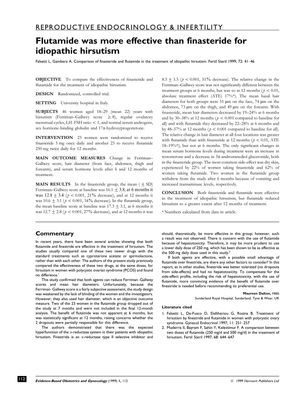Flutamide Was More Effective Than Finasteride for Idiopathic Hirsutism
December 1999
in “
Evidence-based obstetrics and gynecology/Evidence-based obstetrics & gynecology
”

TLDR Flutamide worked better than finasteride for reducing excessive hair growth in women, but had more side effects.
In a study conducted at a university hospital in Italy, 46 women with idiopathic hirsutism were randomized to receive either finasteride (5 mg once daily) or flutamide (250 mg twice daily) for 12 months. The main outcomes measured were changes in Ferriman-Gallwey score, hair diameter, and serum hormone levels after 6 and 12 months of treatment. The study found that both finasteride and flutamide were effective in reducing hirsutism, but flutamide was more effective after 12 months. Specifically, the Ferriman-Gallwey score decreased by 34% with finasteride and by 51% with flutamide, and hair diameter reductions were also greater with flutamide. However, flutamide had a higher incidence of side effects, with 62% of women experiencing dry skin and two women withdrawing due to adverse effects. The study concluded that while both treatments were effective, flutamide had a greater effect on reducing hirsutism after 12 months of treatment.



